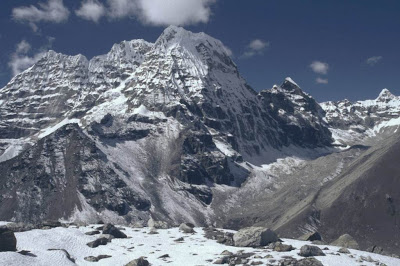A survivor of Mount Everest's worst disaster in eight years has blamed overcrowding on the world's highest peak for his friend's death last weekend.
Song Young-il, 47, of Daejoen, South Korea, told the Daily Telegraph he and his friend Song Wong-bin suffered snow blindness, delirium, and hypothermia as they waited four hours for more than 300 climbers to pass.
When they finally continued their descent, Song Wong-bin collapsed in the notorious section of Everest known as the 'dead zone' for its perilous conditions.
His comments come amid growing concern over the increased risks posed by 'over-climbing' on the mountain during the narrow window between April and June when it briefly becomes surmountable.
Their 'Eco' project was aimed at clearing some of the rubbish which has accumulated on the peak from decades of mountaineering expeditions, including the removal of some dead bodies which had been abandoned on the slopes.On Friday Sherpas were moving the latest four victims to Camp Three and were hoping to send them by helicopter to the Nepali capital Kathmandu.
In a telephone interview from Everest base camp, survivor Song Young-il said he and his friend had reached the summit at 7am with three Sherpas and were making their descent when they became stuck at the perilous 'Hilary's Step', the major obstacle between the summit and South Col, three hours below.
"Then there were so many people. There were 300 to 400 people going to the summit and we got stuck in a traffic jam. We had to wait 200 metres from the summit and we became snow blind. We waited for four hours. We couldn't see.
"We started to come down, slowly, slowly, with the help of our Sherpas. It was hard because we couldn't see anything. It took too long and after that we became crazy," he said.
Loben Sherpa, one of the expedition leaders, explained that as hypothermia and snow blindness set in, the men's brains started 'working unusually.' "At 8500 metres, your brain stops working and you start losing consciousness, because of lack of oxygen, waiting for four hours, hypothermia," he said.
He believes Song Wong-bin's team may have been caught by traffic because they had made their ascent so early and were halted on their way down.
The three Sherpas in their team were helping the climbers down towards South Col on the notorious 'Balcony' when "the other Korean collapsed and died. he died because he had to wait for so long, in my opinion. If you have to wait that long at that altitude it's very dangerous," he said.
The surviving five members of the Korean team were upset, he said, but philosophical. "It's not a good feeling when someone dies, but everyone who comes to Everest knows the risks, it's 50-50 die or live. This area, above South Col, has been recognised as the 'dead zone' and it is very risky," he added.

.JPG)